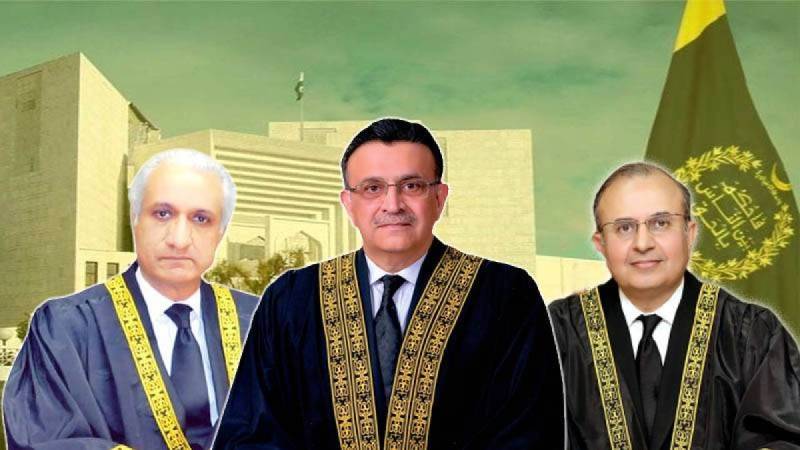
Chief Justice of Pakistan Umar Ata Bandial and Justice Mansoor Ali Shah on Friday continued to express differing observations over technical aspects of law in a case of challenging amendments made to the National Accountability Bureau (NAB) law, which were allegedly allowing those previously prosecuted under the law to be let off the hook.
The contradictory observations from the two judges came as the anti-graft watchdog submitted a report detailing how dozens of graft cases underway in accountability courts have been returned to other courts as a result of the amendments. These include cases against former President Asif Ali Zardari and his close aides, apart from cases against former premier Shahid Khaqan Abbasi.
Amendments to the NAB law had been challenged by former prime minister and Pakistan Tehreek-e-Insaf (PTI) Chairman Imran Khan. A three-judge bench, headed by Chief Justice Umar Ata Bandial and comprising Justice Ijazul Ahsan and Justice Shah resumed hearing of the case on Friday.
In the 52nd hearing of the case, senior lawyer Khawaja Haris represented Imran Khan. At the same time, NAB's Prosecutor Chaudhry Mumtaz Yusaf submitted the report.
During the hearing, CJP Bandial observed that the court could take notice of even a single chit of paper if the matter involves issues of fundamental rights, with the remark a hint at his stance that the petition represented an issue of fundamental rights. He went on to reiterate this stance later in the hearing.
However, while addressing the petitioner's lawyer Haris, Justice Shah observed that it must be seen who wrote the relevant chit and questioned the petitioner's credentials.
Justice Shah went on to observe that the applicant, Imran Khan, had left the national assembly without tendering his resignation so that another person could be elected to his seat and further the interests of the residents of his constituency.
"You are talking about the public trust, and this is what the violation of trust is, that the constituency was left unrepresented," Justice Shah observed while addressing Haris, the counsel representing Imran Khan.
Justice Shah further remarked that the amendment was an issue that should have been debated in the Parliament, the relevant forum for debating laws.
While passing their observations on the case, Chief Justice Umar Ata Bandial regretted that people were leaving the country in droves due to the poor economic opportunities at home.
However, Justice Shah observed that sometimes he felt as if they were tired of pushing too hard to find errors in the law.
He said that when the elections are around the corner, the public should be allowed to elect those who they think can bring better laws, adding that this is how democracy works.
Targeting business community
Chief Justice Bandial further observed that the NAB law had been misused against the country's business community and that he was aware of some businessmen who suffered harm.
He tellingly added that an accountant should not be made to find a mistake of just ten rupees. He regretted that NAB laws were misused against those involved in doing business as per the law.
CJP Bandial went on to observe that corruption harms the society. Still, it is the responsibility of the state to establish a just and fair society.
"We understand that many fundamental rights have been affected by the NAB amendments," he observed.
The Chief Justice further observed that the evidentiary value of evidence acquired under the Mutual Legal Assistance (MLA) clause has almost been rendered worthless through amendments.
Now, NAB will have to take services there, which will be costly, he added, further observing that the records obtained by the Federal Board of Revenue (FBR) from foreign jurisdiction cannot be presented as admissible evidence in court.
Regarding the conviction rate in criminal cases, the chief justice observed that in our criminal justice system, the conviction rate was below 70 percent, and many of these cases are settled in the advanced stages. The chief justice observed that the lack of coordination between prosecution and investigation is a matter of concern.
He further observed that the complainant in a murder case did not get relief and that it was the state's duty to dispense justice to the people.
NAB cases returned
On Friday, NAB's Prosecutor Chaudhry Mumtaz Yusaf submitted a report to the apex court on all the cases returned by the NAB courts following the amendments.
He stated that 12 corruption references were transferred from accountability courts in 2023, while a total of 22 cases were returned after the amendments.
Among the high-profile cases returned from accountability courts after the amendment was a corruption reference against former president Asif Ali Zardari in the Park Lane case.
NAB further said that the accountability court had transferred the alleged Liquefied Natural Gas (LNG) corruption case, lodged against former prime minister Shahid Khaqan Abbasi, to the Islamabad Special Judge Central after the amendments.
NAB said that the alleged Pink Residency corruption case, lodged against Khwaja Abdul Ghani Majeed -- a close aide of Zardari, has been transferred to the Anti-Corruption Court in Sindh.
The case of Hussain Lawai, the main suspect in the fake bank accounts case, now sits outside the purview of NAB due to the amendments, the top court was informed.

